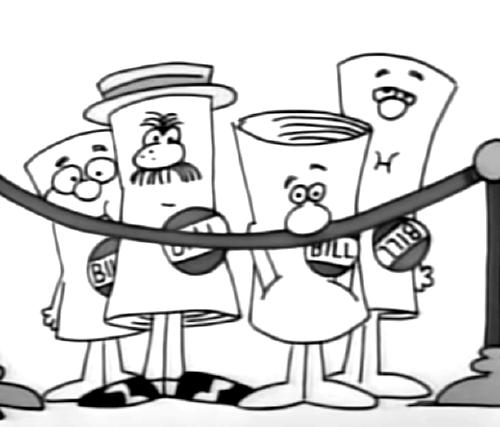Keyword: Bureaucracy
The Limits, or Lack Thereof, of Bureaucratic Powers
This post is was written rather hastily as a college essay writing assignment and is not reflective of anything other than the imminent deadline.
The bureaucracy is expanding to meet the needs of the expanding bureaucracy.
— Oscar Wilde
Bureaucracy in the mind of the average American is typically a prescriptive arm of government. It is the clerk at the DMV, demanding yet one more proof of identity, or the stamp of approval from the county’s Building Code Advisory Board to put up a shed in the backyard. However there is nothing in the structure of bureaucracy, in the United States or elsewhere, that restricts it to these duties.
Lacking any reason not to, the bureaucracy has evolved into a descriptive mechanism designed to short circuit legislative process. The impetus for this evolution is a response to failings of democratic systems. In this post we’ll briefly explore the whys and hows of that evolution.
A Layman’s Democracy
As a student in American public school I learned about the basic process of American governance the same way that many in my generation did: School House Rock.
From that absolute bop of a video one might draw the conclusion that this process is how all laws and regulations come to fruition, but we can already see the shortcomings of this system. As our friend the Bill points out, “I’m one of the lucky ones, most bills never even get this far.” Most bills die in committee, or are filibustered so they can never come to a vote. These bills aren’t unimportant or unworthy, they address problems facing the American people where truly, “their oughta be a law”.

There exist problems where a bad or imperfect law can do more harm than good, but there also exist a plethora of problems where any law would be better than no law. When it comes to issues like food safety, environmental protection, or commercial licensing, it’s hard to do worse than no law at all. Here the parliamentary system so artfully described by School House comes to a crashing halt. These types of problems need expert and (relative to Congress) dynamic shepherds.
Congress has recognized this problem, or more probably finds dealing with these issues very tiresome, and has recruited such shepherds. These are the independent federal agencies, and they are legion.
Shepherds of the Republic
An independent federal agency is defined by the Supreme Court as an agency with “quasi-legislative or quasi-judicial powers” and belonging to those respective branches of government (insomuch as they belong to any branch of government). The truth of the matter is they are independent executives, beholden to no one directly. Some are considered so outside of government that short of neglect of duty or malfeasance their officers cannot be fired, even by the President.
These bureaucratic structures are born from enabling-acts, such as the Federal Food, Drug, and Cosmetic Act which established the FDA. They are staffed by career civil servants and headed up by presidential appointees confirmed by Congress. This creates a Constitutional tightrope. The powers of the agencies are derived from democratically elected individuals, but none of the people writing the rules and regulations were themselves elected.

And write rules they do, the number of rules issued by independent agencies dwarfs the rate that Congress passes laws at a ratio of 18-to-1. While the Senate celebrated moving from a “one-track” to a “two-track” system back in 1975, doubling the number of laws it can drag its feet on at a time, the various agencies wrote and enacted new rules and regulatory actions by the thousands.
Which is to say, the bureaucracy is not merely part of government it is most of government.

This isn’t to say that the bureaucracy is ineffective, quite the contrary. The Federal Reserve for example, foremost among and one of the most independent of the federal agencies, has done a formidable job of guiding an the American economy to prosperity. The ability to appoint knowledgeable economists and business people to chair the agency and allow them act decisively and unilaterally is widely recognized as in the public interest.
The question moving forward should not be: how can democracy claw back control from the bureaucracy? The numbers demonstrate that’s a lost cause. The question is: what can democracy learn from the bureaucracy?
Lessons of the Bureaucrat
Far from the stereotype of being bogged down by paperwork and procedure, the federal agencies move at a blazing speed compared to Congress. This is the prime take-away from the rise of the administrative state. Bureaucracies exist not to slow-down government, but rather arise to signal the procedures of government are failing to respond to dynamic situations.
Recent push-back against filibusters and the use of workarounds such as budget reconciliation demonstrate recognition of this flaw in the legislative process. A system that could pass imperfect laws without fear, because it was also capable of passing legislation that revisited and improved those laws would be a world ahead of the obstructive inaction of the now.
Ultimately, we cannot be more poorly served than with the democratically elected representatives frozen, and the appointed bureaucrats ablaze. Fittingly, any action, even imperfect, would be good action.